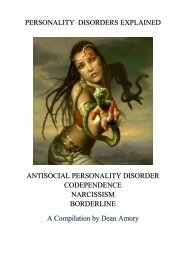Social and Psychological Manipulation - Dean Amory
Unlike people who are trying to influence, persuade or convince others, manipulators work with unfair means to get what they want. They do not respect the personal rights of their victims. They violate the victim's integrity, work with hidden agendas and deliberately use dishonest tricks like faulty reasoning, coercion, blackmail and lying in an attempt to control the victim's actions. Manipulation is about suiting the manipulator's advantage or purpose only, often at the expense of the victim. Yet, it is often difficult to know when you are being manipulated: manipulators do all they can to convince you that you are the one who is to benefit most from their actions and that they are acting in good faith. If we were aware that we are being manipulated, would we allow ourselves to fall victim to it - and how would we defend ourselves against it? That is where this book comes in handy: it explains the tricks manipulators use and teaches you how to best defend and
Unlike people who are trying to influence, persuade or convince others, manipulators work with unfair means to get what they want. They do not respect the personal rights of their victims. They violate the victim's integrity, work with hidden agendas and deliberately use dishonest tricks like faulty reasoning, coercion, blackmail and lying in an attempt to control the victim's actions. Manipulation is about suiting the manipulator's advantage or purpose only, often at the expense of the victim.
Yet, it is often difficult to know when you are being manipulated: manipulators do all they can to convince you that you are the one who is to benefit most from their actions and that they are acting in good faith.
If we were aware that we are being manipulated, would we allow ourselves to fall victim to it - and how would we defend ourselves against it?
That is where this book comes in handy: it explains the tricks manipulators use and teaches you how to best defend and
Create successful ePaper yourself
Turn your PDF publications into a flip-book with our unique Google optimized e-Paper software.
There may be persistent irritability as an associated feature.<br />
The diagnosis includes what may be referred to as amoral, antisocial, psychopathic, or sociopathic<br />
personality (disorder.) The criteria specifically rule out conduct disorders. Dissocial personality<br />
disorder criteria differ from those for antisocial <strong>and</strong> sociopathic personality disorders.<br />
The Diagnostic <strong>and</strong> Statistical Manual of Mental Disorders, fourth ion (DSM IV-TR), defines<br />
antisocial personality disorder (in Axis II Cluster B) as:<br />
A) There is a pervasive pattern of disregard for <strong>and</strong> violation of the rights of others occurring since age<br />
15 years, as indicated by three or more of the following:<br />
1. failure to conform to social norms with respect to lawful behaviors as indicated by repeatedly<br />
performing acts that are grounds for arrest;<br />
2. deception, as indicated by repeatedly lying, use of aliases, or conning others for personal profit or<br />
pleasure;<br />
3. impulsiveness or failure to plan ahead;<br />
4. irritability <strong>and</strong> aggressiveness, as indicated by repeated physical fights or assaults;<br />
5. reckless disregard for safety of self or others;<br />
6. consistent irresponsibility, as indicated by repeated failure to sustain consistent work behavior or<br />
honor financial obligations;<br />
7. lack of remorse, as indicated by being indifferent to or rationalizing having hurt, mistreated, or<br />
stolen from another;<br />
B) The individual is at least age 18 years.<br />
C) There is evidence of conduct disorder with onset before age 15 years.<br />
D) The occurrence of antisocial behavior is not exclusively during the course of schizophrenia or a<br />
manic episode.<br />
Behavioral addiction:<br />
Increasingly referred to as process addiction or non-substance-related addiction behavioral addiction<br />
includes a compulsion to repeatedly engage in an action until said action causes serious negative<br />
consequences to the person's physical, mental, social, <strong>and</strong>/or financial well-being. One sign that a<br />
behavior has become addictive is if it persists despite these consequences.<br />
The type of behaviors which some people have identified as being addictive include gambling, food,<br />
sex, viewing of pornography, use of computers, playing video games, use of the internet, work,<br />
exercise, spiritual obsession (as opposed to religious devotion), cutting, <strong>and</strong> shopping.<br />
22


















